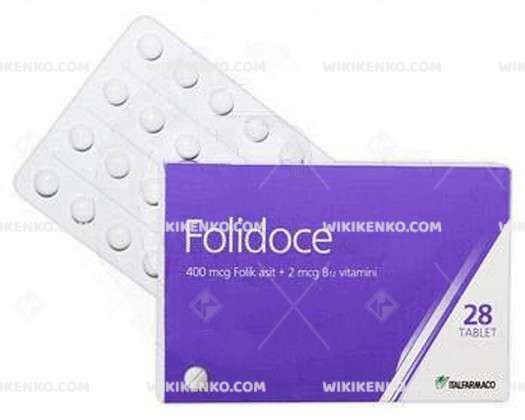Folidoce Tablet
In the realm of prenatal care and neural tube defect prevention, Folidoce Tablet stands as a beacon of hope for expectant mothers. This comprehensive guide delves into the intricacies of Folidoce, offering insights into its active ingredients, uses, precautions, price, availability, and potential side effects. If you seek clarity on this essential medication, join us on a journey through its vital aspects.
| Dosage form | |
|---|---|
| Pack size | |
| Potency | Combined |
| Manufacturer | |
| Origin | |
| Generic Name (Ingredient) | Each Tablet Contains 400 Micrograms Of Folic Acid, 2 Micrograms Of Cyanocobalamin (Vitamin B12). |
Assuming your emergency circumstances for this product, visit Urgent Quotation page. Besides, for any pharmaceutical questions, please ask us in the comments section.
Description
Folidoce emerges as a vital medication housing 400 micrograms of folic acid and 2 micrograms of Vitamin B12 as its dynamic duo of active ingredients. These elements collectively play a pivotal role in promoting maternal and fetal well-being.
Folic Acid and Vitamin B12
Folic Acid: Folic acid, a critical B vitamin, takes center stage in Folidoce’s composition. Its significance lies in its ability to facilitate the formation of new cells, making it indispensable during pregnancy, where rapid cell division is paramount. Folic acid also assumes a protective role, guarding against neural tube defects like spina bifida in newborns.
Vitamin B12: Working in tandem with folic acid, Vitamin B12 serves as a crucial companion. It bolsters the functionality of folic acid, ensuring that its vital role in cell division and neural tube defect prevention is optimized.
Precautions and Considerations
Before embarking on a Folidoce regimen, certain precautions merit attention:
- Allergies: Folidoce should be avoided if you exhibit allergies to folic acid, Vitamin B12, or any auxiliary components within the medication.
- Cancer: Individuals grappling with any form of cancer should refrain from Folidoce usage.
Accessibility
This essential medication is exclusively available through pharmacies, ensuring its accessibility to those in need.
Folidoce Side Effects
The path to health sometimes comes with side effects, and Folidoce is no exception. Potential side effects encompass gastrointestinal discomfort, epigastric pain, stomach cramping, constipation, nausea, vomiting, diarrhea, dark stools, heartburn, and discolored urine. While these effects are not universal and often mild, they should not be disregarded. If you experience any of these symptoms, prompt consultation with a healthcare practitioner is recommended.
Dosage
The recommended dosage of Folidoce, which houses folic acid, is contingent on specific needs. Here are some general dosage guidelines:
- Preconception and Early Pregnancy: To safeguard maternal and fetal health, Folic acid should be taken daily, ideally starting three months before conception and continuing throughout the first 12 weeks of pregnancy.
- Folate Deficiency Anemia Treatment: For adults and children above 1 year old grappling with folate deficiency anemia, a daily dose of 5mg is typical. In certain cases, this dosage may increase to 15mg per day.
- Folate Deficiency Anemia Prevention: To avert anemia, adults and individuals aged 12 and above typically take 5mg every 1 to 7 days.
It is vital to recognize that these guidelines serve as a foundational framework. Personalized medical advice, contingent on individual health factors, should always be sought from a healthcare professional.
In Summation
Folidoce tablet takes on the role of a guardian, offering the daily recommended dose of folic acid and Vitamin B12. Its primary mission is to act as a shield against neural tube defects in infants, making it an indispensable component of maternal care. However, akin to all medications, its usage should be conducted under the vigilant eye of a healthcare professional.
Table: Navigating Folidoce Tablet
| Aspect | Details |
|---|---|
| Product | Folidoce Tablet |
| Active Ingredients | Folic Acid (400 mcg), Vitamin B12 (2 mcg) |
| Precautions | Allergies to components, history of cancer |
| Accessibility | Exclusively available through pharmacies |
| Usage | Prevents neural tube defects, maternal health |
| Potential Side Effects | Gastrointestinal discomfort, urinary changes |
| Dosage Recommendations | Personalized advice from healthcare professional |
In the realm of maternal care and prenatal health, Folidoce Tablet emerges as a stalwart companion. Its core components, folic acid and Vitamin B12, synergize to protect against neural tube defects and promote maternal well-being. Nevertheless, the voyage towards health should always be orchestrated under the guidance of healthcare professionals who can tailor the Folidoce regimen to individual needs.
Use the form below to report an error
Please answer the questions as thoroughly and accurately as possible. Your answers will help us better understand what kind of mistakes happen, why and where they happen, and in the end the purpose is to build a better archive to guide researchers and professionals around the world.
The information on this page is not intended to be a substitute for professional medical advice, diagnosis, or treatment. always seek the advice for your physician or another qualified health provider with any questions you may have regarding a medical condition. Always remember to
- Ask your own doctor for medical advice.
- Names, brands, and dosage may differ between countries.
- When not feeling well, or experiencing side effects always contact your own doctor.
Cyberchondria
The truth is that when we’re sick, or worried about getting sick, the internet won’t help.
According to Wikipedia, cyberchondria is a mental disorder consisting in the desire to independently make a diagnosis based on the symptoms of diseases described on Internet sites.
Why you can't look for symptoms on the Internet
If diagnoses could be made simply from a textbook or an article on a website, we would all be doctors and treat ourselves. Nothing can replace the experience and knowledge of specially trained people. As in any field, in medicine there are unscrupulous specialists, differences of opinion, inaccurate diagnoses and incorrect test results.



Reviews
There are no reviews yet.